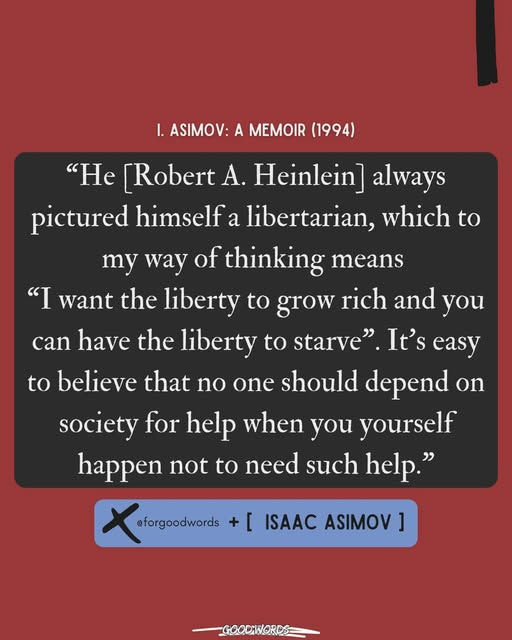- Asimov on Heinlein, about libertarianism;
- More about “viewpoint diversity” in science, and how scientists react;
- About another stupidly doctored photo by Trump, to prove something to his dimwitted followers;
- How the history Trump wants to erase hold the answer to his future;
- How elections seem to swing back and forth parties, and whether this will continue;
- And Bruckner 8, movement 3, and the history of classical music.
Another item seen in passing on Facebook today, from more than one person. I’ll save the image rather than linking it.
This struck me because it reminded me of the comment someone made recently about the people who most love low taxes and a small government are the very wealth, because they benefit from the first and don’t need the second. Never mind the many more people who *do* depend on government services, even if they don’t realize it. We’re now seeing how that might work out.
\\\
Here’s another take on the administration’s current bugaboo of insisting on “viewpoint diversity” in academia, and in particular in science. This echoes what Steven Pinker said as quoted in this post three days ago.

Boing Boing, Jennifer Sandlin, 19 Apr 2025: DOJ’s menacing letter to med journals “a chill down the spine of scientists”
The piece quotes a letter sent by the DOJ to various scientific journals, with questions like these:
*How do you clearly articulate to the public when you have certain viewpoints that are influenced by your ongoing relations with supporters, funders, advertisers, and others?
*Do you accept articles or essays from competing viewpoints?
It’s clear the DOJ is trying to ferret out DEI or ‘woke’ or whatever, without realizing who they’re speaking to. So:
Dr. Eric Reinhart provided a scathing critique of the letter, commenting, for instance, on the absurdity of the notion of “viewpoint diversity” in scientific research:
‘Viewpoint diversity’ – is sarcoidosis actually bad? Should trans people get treatment for chest infections? Is ivermectin the cure for lung cancer? Why shouldn’t Joe Rogan perform lung transplants? So glad RFK Jr is in charge to ensure these important views get airtime.
With further speculation about why his particular journal, CHEST, might have been targeted. (By people who know nothing, it might be said again.)
\\\
Many stories today about the latest lunacy from the Trump administration.

Joe.My.God, 19 Apr 2025: Trump Posts Doctored Photo Of Kilmar Abrego Garcia
The administration insists the guy is a gang member, and so posted this *obviously* doctored photo, apparently to prove something to all his dimwitted followers. (Remember his altered weather forecast map? Apparently it’s called Sharpiegate, and as its own Wikipedia page.)
\\\
The past seems to foretell the future. Because human nature being what it is.

Salon, Douglas H. White, 18 Apr 2025: History holds the answer to Trump’s future, subtitled “To fight Trump’s vision of the future, turn to the history he wants to erase”
\\\
It’s long been noticed that US presidential elections swing back and forth between parties, very regularly. Is it because that sentiment changes about which way the country should go? I doubt that, because I don’t think that sentiment sways much. More, it’s about how Americans don’t understand our system of government, or the way politics works, and so blame each administration for whatever they perceive is not going right, despite the fact that the things not going right are not under the control of the president, or even his administration. (Though the current one is doing its best the control everything.)

OnlySky, Mary T Luthenauer, 18 Apr 2025: The pendulum always swings, until it doesn’t, subtitled “Have we finally reached a moment when American politics will not swing back?”
US politics and culture are cyclical, alternating between values. On the large scale, the shifting social psychology of the American electorate is as predictable as a Carter following a Nixon. When we’re in one of the swings of that pendulum, it feels like a permanent condition, and that is certainly the national feeling right now.
But if democracy continues to have any say in the matter — admittedly a big “if” at the moment — the status quo will grow tiresome to just enough voters in the middle to push the pendulum the other way for a while.
So many modifiers and conditionals in that sentence.
With background about the Gilded Age of the late 19th century, and so on. The 1950s, and so on. Long piece. Concluding:
Pendulum swings are not guaranteed. In regimes where dissent is muted, institutions are hollowed out, and elections are performative, the natural oscillation between competing values stops. Instead of correction, societies become trapped in a single mode—and it’s rarely the compassionate one.
Unless democratic mechanisms are defended and restored, the US could find itself not in a phase awaiting reversal, but in a stalled system where the very structures that allow for political and cultural renewal have been dismantled. The pendulum doesn’t stop because people no longer want change—it stops because the machinery that turns it has been broken.
\\\
The most sublime moment in all of classical music. The peak of the third movement of Bruckner’s 8th symphony. It’s about 21 minutes in.
More to the point, it takes listening to the entire 3rd movement to understand why this moment is sublime (twice, it tries reaching for the stars, the third time it succeeds); it takes listening to all of Bruckner’s symphonies, and the many times he tries similar patterns of the traditional symphonic structure, over and over, before he could achieve this sublime. And maybe it takes understanding the history of classical music, how the symphonic structure came to be in this form, and how the most powerful moments of symphonies from Beethoven to Mahler were often left to the slow movements. After the 8th, Bruckner tried one more time, in the 9th, left unfinished. Its 3rd movement was rather similar to the 8th’s, but abbreviated, and didn’t quite achieve the 8th’s power. More to the point: context is everything. You can take in a novel or a symphony at face value, but each means much more in the context of its artistic history.
This is why people are so often disappointed by this or that “classic” novel or movie. You have to have read many novels and seen many movies to understand why the “classic” ones stand out.






